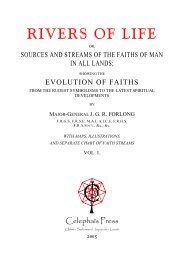Dutch Fairy Tales by William Elliot Griffis.pdf
Dutch Fairy Tales by William Elliot Griffis.pdf
Dutch Fairy Tales by William Elliot Griffis.pdf
You also want an ePaper? Increase the reach of your titles
YUMPU automatically turns print PDFs into web optimized ePapers that Google loves.
<strong>Dutch</strong> <strong>Fairy</strong> <strong>Tales</strong> for Young Folks<br />
The treeless, desolate land, which, a moment before, was full of struggling goblins and men, became as quiet<br />
as the blue sky above. Nothing but some rounded rocks or stones, in groups, marked the spot where the<br />
bloodless battle of imps and men had been fought.<br />
There, these stones, big and little, lie to this day. Among the buckwheat, and the potato blossoms of the<br />
summer, under the shadows and clouds, and whispering breezes of autumn, or covered with the snows of<br />
winter, they are seen on desolate heaths. Over some of them, oak trees, centuries old, have grown. Others are<br />
near, or among, the farmers' grain fields, or, not far from houses and barn−yards. The cows wander among<br />
them, knowing nothing of their past. And the goblins come no more.<br />
THE MOULDY PENNY<br />
“Gold makes a woman penny−white,” said the <strong>Dutch</strong>, in the days when fairies were plentiful and often in<br />
their thoughts. What did the proverb mean? Who ever saw a white penny?<br />
Well, that was long ago, when pennies were white, because they were then made of silver. Each one was<br />
worth a denary, which was a coin worth about a shilling, or a quarter of a dollar.<br />
As the <strong>Dutch</strong> had pounds, shillings and pence, before the English had them, we see what d in the signs L s. d.<br />
means, that is, a denary, or a white penny, made of silver.<br />
In the old days, before the <strong>Dutch</strong> had houses with glass windows or clothes of cloth or linen, or hats or shoes,<br />
cows and horses, or butter and cheese, they knew nothing of money and they cared less. Almost everything,<br />
even the land, was owned in common <strong>by</strong> all. Their wants were few. Whenever they needed anything from<br />
other countries they swapped or bartered. In this way they traded salt for furs, or fish for iron. But when they<br />
met with, or had to fight, another tribe that was stronger or richer, or knew more than they did, they required<br />
other things, which the forests and waters could not furnish. So, <strong>by</strong> and <strong>by</strong>, pedlars and merchants came up<br />
from the south. They brought new and strange articles, such as mirrors, jewelry, clothes, and pretty things,<br />
which the girls and women wanted and had begged their daddies and husbands to get for them. For the men,<br />
they brought iron tools and better weapons, improved traps, to catch wild beasts, and wagons, with wheels<br />
that had spokes. When regular trade began, it became necessary to have money of some kind.<br />
Then coins of gold, silver, and copper were seen in the towns and villages, and even in the woods and on the<br />
heaths of Holland. Yet there was a good deal that was strange and mysterious about these round, shining bits<br />
of metal, called money.<br />
“Money. What is money?” asked many a proud warrior disdainfully.<br />
Then the wise men explained to the fighting men, that money was named after Juno Moneta, a goddess in<br />
Rome. She told men that no one would ever want for money who was honest and just. Then, <strong>by</strong> and <strong>by</strong>, the<br />
mint was in her temple and money was coined there. Then, later, in Holland, the word meant money, but<br />
many people, who wanted to get rich quickly, worshipped her. In time, however, the word “gold” meant<br />
money in general.<br />
When a great ruler, named Charlemagne, conquered or made treaties with our ancestors, he allowed them to<br />
have mints and to coin money. Then, again, it seemed wonderful how the pedlars and the goldsmiths and the<br />
men called Lombards—strange long−bearded men from the south, who came among the <strong>Dutch</strong>—grew rich<br />
faster than the work people. They seemed to amass gold simply <strong>by</strong> handling money.<br />
When a man who knew what a silver penny would do, made a present of one to his wife, her face lighted up<br />
with joy. So in time, the word “penny white,” meant the smiling face of a happy woman. Yet it was also<br />
THE MOULDY PENNY 55






![[PDF] Prolegomena](https://img.yumpu.com/16774951/1/190x245/pdf-prolegomena.jpg?quality=85)









